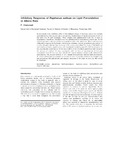Inhibitory response of Raphanus sativus on lipid peroxidation in albino rats
Date
2008-03Author
Chaturvedi, P.
Publisher
Oxford University Press, Oxford Journals; http://ecam.oxfordjournals.org/Type
ArticleMetadata
Show full item recordAbstract
In the present study, inhibitory effect of the methanol extract of Raphanus sativus root on lipid
peroxidation has been carried out in normal rats. Graded doses of methanol extract of root of
the plant (40, 80 and 120 mg kg 1 body weight) were administered orally for 15 days to
experimental treated rats. Distilled water was administered to experimental control rats. At the
end of experiment, rats were killed by decapitation after ether anesthesia. Blood and liver were
collected to measure thiobarbituric acid reactive substance, reduced glutathione and activity of
catalase. Results indicated that the extract of R. sativus root reduced the levels of thiobarbituric
acid reactive substance significantly in all experimental treated groups (P50.05) as compared to
the experimental control group. It also increased the levels of reduced glutathione and increased
the activity of catalase. In vitro experiments with the liver of experimental control and
experimental treated rats were also carried out against cumene hydroperoxide induced lipid
peroxidation. The extract inhibited in vitro cumene hydroperoxide induced lipid peroxidation.
R. sativus inhibits lipid peroxidation in vivo and in vitro. It provides protection by strengthening
the antioxidants like glutathione and catalase. Inclusion of this plant in every day diet would
be beneficial.

